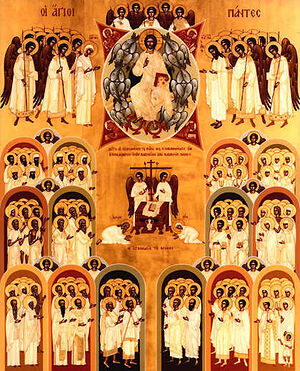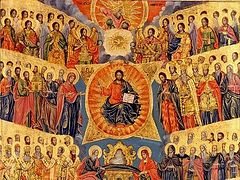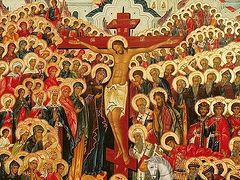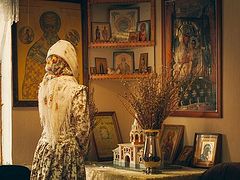 A holy union exists between the saints and Pentecost. For the saints are those upon whom the grace of Pentecost has been poured out, and through whom the grace of Pentecost continues to be active in the world. They become living sacraments to Jesus Christ; they draw every grace and truth from the Church’s Sacraments. The Divine truth was stored deeply in the depths of the saints’ hearts, begetting the theology of the living knowledge of God. This is how the saints, the bearers of Pentecost, are born. The Divine image and likeness are restored only at this level of holiness. This is why Christ commanded us, Be ye holy; for I am holy.
A holy union exists between the saints and Pentecost. For the saints are those upon whom the grace of Pentecost has been poured out, and through whom the grace of Pentecost continues to be active in the world. They become living sacraments to Jesus Christ; they draw every grace and truth from the Church’s Sacraments. The Divine truth was stored deeply in the depths of the saints’ hearts, begetting the theology of the living knowledge of God. This is how the saints, the bearers of Pentecost, are born. The Divine image and likeness are restored only at this level of holiness. This is why Christ commanded us, Be ye holy; for I am holy.
The characteristic virtue of the saints is their unceasing pursuit of Divine perfection, as far as they are able. They did not reach this level of Divine perfection due to their moral or social perfection, but thanks to their unceasing transfiguration toward perfection; the transfiguration of the nous and heart through an act of unceasing eros solely toward the True Christ. For the love of Christ, they gave up this world, all worldly attachments and bodily pleasures, and underwent an unceasing journey to the Heavenly Kingdom. They subjugated their bodies through asceticism and self-denial in order to submit them to the spirit.
The saints knew that holiness is brought about by this attentiveness in keeping Christ’s commandments—all the commandments, even the smallest ones. But it’s impossible to keep the commandments before controlling the passions. This is why they loved asceticism— much fasting and many prostrations, focused prayer with tears and tireless vigils, with much endurance and constant humility. St. Ephraim the Syrian emphasizes the action of grace in the struggling souls saying: “God plants His seeds in ascetical bodies.” Our saint then proceeds to say that without struggle and labor, “nobody will be crowned, neither in this life nor in the next.” It’s impossible to reach holiness without asceticism, because it is this asceticism that subdues the passions of self-love and transforms it into the love of Christ. The saints’ perfection, which does not end, is the love of Christ.
The saints are those who were born again from repentance and the spirit. The journey of a saint is the journey of a penitent, who may have begun from all types of sins, passions, and heresies. The saints are those who knew their spiritual weakness and poverty and so surrendered their life to Christ in unceasing repentance. They did not despair because of the multitude of distress, demons, temptations, and falls, but because of their weakness they received much humility, enabling them to stand up against sin and resist it unto death.
Their strong endurance attracted much grace; it healed their hardness of heart, and taught them unceasing prayer. What characterizes the saints is that they do not feel their virtues, but they deeply feel their sins and their need for God’s mercy. This grants them repentance and mourning over their sins, knowing that they are worthy of hell and all condemnation. This is the mystery of the action of grace in the humility of the saints. The saints’ repentance does not end—they repent and do not despair, knowing that their sins are forgiven by repentance; but they also know that if repentance stops, their sins will return, more evil than before.
With respect to faith, the saints refused to conform to the spirit of the age but rather fought against its influences. They strongly confronted heresies—all types of heresies—knowing that they carry the spirit of satan. Heresy is incompatible with holiness; and new heresies have several faces: ecumenism, syncretism, modernism, etc. They are all at odds with holiness. Those who surrender themselves to this religious globalism, to the spirit of the age and to endeavors to renovate Church life according to the dictates of modern life cannot be sanctified. How can he be sanctified who distorts the pure faith of the saints and mixes it with a teaching coming from the demon of contradiction and boastful intellect?
Those who place obstacles before the faithful, who make God’s children doubt the Sacraments and holy things, who themselves doubt the holy light of the Resurrection and the grace contained in holy relics, surrender themselves to the spirit of delusion. The beginning of love of neighbor is to remove the doubts and obstacles from his journey of salvation, for his steadfastness in the faith and his growth in hope. The saints despised erecting barriers, teaching that it brings great condemnation.
Saints are not made with a multitude of theories, pride, and arrogance, but by submitting their thoughts and will to Christ and His Church. Saints are born from the canon of the Orthodox faith, the law of eternal life. Saints are the fruit of obedience to the Orthodox faith, the fruit of surrendering their own will to the collective experience that is, first and foremost, formed by the strength of faith, then by labor, fastings, and prayers. Saints are born from Church Tradition, from the submission of their every thought to Church Tradition.
The saints understood that obedience empties the soul of its selfishness and reliance on its own concepts, such that it willingly submits to the mind of the holy Church, to its dogmas and its canons. Thus, the experience of the saints continues complete and perfect, unchanging from age to age, through obedience to the Orthodox faith. Only those souls who, by faith and obedience, have united their will with God’s will are able to be sanctified and to sanctify, to be enlightened and enlighten, and to firmly establish the Church in the journey of its saints.
This is how the Church becomes the maker of saints; otherwise it would lose the meaning of its existence. Was not this the purpose for which the Son of God came into the world? A church that does not produce ascetics and saints who moved from intellectual faith to the experience of Divine revelation easily becomes a church of laws and morals, a worldly church devoid of spirit, freely heading toward extinction and destruction. Saints are the products of Divine grace, which is exclusively associated with the true, correct faith. And outside this truth, there exists neither grace nor holiness.
This is why the Orthodox Church does not recognize saints from without; there are no non-Orthodox saints. This judgment is not extremist, for with regard to the Orthodox Church, holiness is not established by psychological-emotional states, by a commendable moral life, or by a distinguished social ministry, as is the criterion of the non-Orthodox. It is rather an existential participation in the correctness of the faith and in God’s Uncreated Light, after complete liberation from the passions. For without grace, man is not only unable to be sanctified, but he is also unable to present a pleasing work before God. This is why St. Ephraim the Syrian commands us to have no communion with heretics—because they have no good works, as they have departed from Divine grace as a consequence of their departure from the correct faith.
All those who have struggled for the Orthodox faith throughout history, who have “labored and taught,” have been sanctified. In the age of apostasy that will prevail in the last days, many will become weak-willed; they will not only conform and apostatize from truth, but they will also persecute those who hold on to this truth. Those who will accept persecution for the Cross of Christ will not be many. Is not Orthodoxy the bearer of the Cross of Christ in this world?
Nevertheless, there will always be saints in this world. For those saints, with their living faith, asceticism, pure prayer, and their victory over filthy demons, sanctify not only the place where they dwell in asceticism, but the whole world also receives rays of the grace at work within them. This is why the judgment of this current world will not come as long as enough true Orthodox saints remain, as a holy leaven for this miserable world. Orthodox saints are the foundations of the continuous existence of the world. These saints will become very few as time progresses towards the end, though they may be more radiant in the age of great apostasy.



